Achter de schermen bij grasmeester Jan van de Velden (artikel in het Engels)
Bij Boerenmacht geldt de regel dat alle supporters een stukje kunnen insturen, wat ons betreft maakt ons dat een fansite in plaats van alleen een nieuwssite. Toen kregen wij afgelopen week via Facebook een bericht, het betrof de Oostenrijkse Christian Albrecht. Vanwege een uitwisseling met zijn studie Journalistiek was hij in Groningen terecht gekomen, en sinds september heeft hij elke thuiswedstrijd bezocht. Toen hij een artikel moest schrijven, was het voor hem dan ook geen moeilijke keuze wat het onderwerp zou worden. Hij vroeg ons of we zijn artikel wilden publiceren, en wij vonden dat geen probleem. We hebben het interview met grasmeester Jan van de Velden expres niet vertaald, want het is ook wel eens leuk om wat anders te doen op de site. Voor degenen die de Engelse taal niet genoeg beheersen om het verhaal te kunnen lezen, voor jullie komen er nog genoeg Nederlandse verhalen dit jaar ;).
“Grass is also playing top-sports”
It is green, has an area of around 7,140 square metres and in times of capitalism the slightest irregularity on its surface can win or lose your football club a massive amount of money – the football pitch. Jan van de Velden is what a beauty specialist is for your complexion, just that he takes care of the essence of every cultivated football game.
By Christian Albrecht
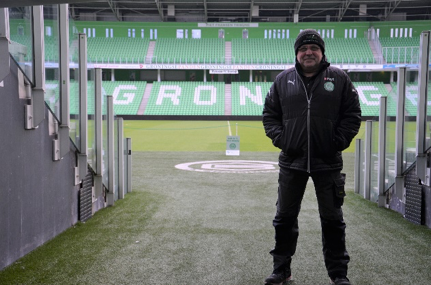
His name says it all, the 64-year-old is “Jan from the fields”. Since 2012, van de Velden is head-groundsman of Eredivisie-club FC Groningen. Born in Utrecht, the football-enthusiast went through the green side of education, studied at a garden school and specialised himself as a florist and as a greenkeeper for trees and gardens. Before he moved to the north of the Netherlands, where he had his own flower shop, van de Velden spent a lot of time in France, had a flower atelier in Paris and – as he says – the biggest tomato of Corsica. By importing wines from the south of France and selling them via his own small wine company, he upholds his strong bond to the Grande Nation still.
“I am football”
A few days before the last home game of 2018, I meet with Jan van de Velden in front of Euroborg stadium in the south-east of Groningen. We pass by the entrance desk, the VIP-club and go downstairs to the cantina of the technical service, which is more or less an eat-in kitchen. On the walls there are a cardboard of the KNVB-Beker – the national cup, which the club won for the first time in 2015 –, printouts of the amount of potassium, nitrogen and phosphorous contained in the stadium pitch and a picture of the celebration process of striker Mimoun Mahi kissing the grass. “I am football,” says van de Velden, as he offers me a cup of coffee. “It is a passion, unexplainable maybe. Something in your mind is twisted.”
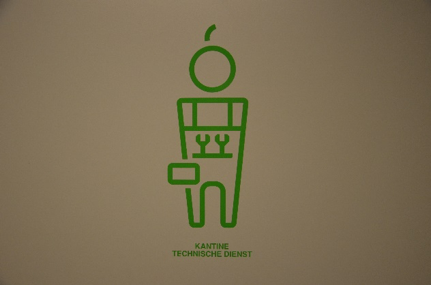
Green is the dominating colour at Euroborg -
(c) Christian Albrecht
As a kid, he was laying under the table out of sight of his parents to catch a glimpse of football on the TV, today the football stadium is his second home. “When my kids were born, I chose to be there for them. As they grew up, I got more free time and started volunteering at FC Groningen,” recounts the man, who played two matches for a small club in Utrecht before he ended his professional career due to lack of talent. “I then worked for Support In Sport, a company, which keeps pitches all over the world in order. 8 years ago, FC Groningen decided to install their own ground keeping facilities and I became head-groundsman.” When being asked about the main difference between working for a company and for a football club itself, his answer is as short as the grass on the stadium’s pitch: budget. “Plus, the responsible of the club are more critical when you are working for an external company.”
“There is no regular day”
After finishing our coffees, van de Velden guides me around the inside of the stadium. As we head to the dressing rooms, we pass by pictures of the groundsman’s all-time favourite player Arjen Robben – besides the Dutch legend Johan Cruijff, of course. FC Groningen was the Bayern-star’s first professional club, after two years PSV Eindhoven called. We go downstairs to the entrance tunnel, where the players gather before heading onto the field. Right next to it is the storage room, where van de Velden holds all his equipment to mow, aerate, fertilise and much more. For we chose a quiet working day for our meeting, I ask him, how a regular day of work looks like. “There is no regular day,” he says. “My two assistants and I have to be flexible, it is never steady. Whereas in summer we have to mow pretty much every day, in winter it is mostly repairing. Every day we look, do we need to fertilise? Do we need to aerate? I do not have a nine-to-five-job, you start and see how far you get. Sometimes you finish at 3h30, you are not going to start a new project.
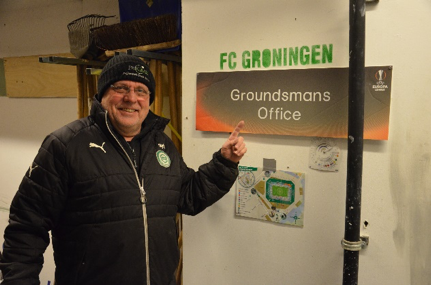
In the 2015 Europa League season Groningen played Liberec, Marseille and Braga - (c) Christian Albrecht
The weather is a big factor, as well. When it is raining, you avoid mowing as best as you can. “Actually, when you are good at your job, you know that it is going to rain and finish before it starts,” explains van de Velden. Only at matchday the groundsmen have a real routine. “It is best to prepare the pitch just before the match, two hours before the kick-off we are ready, and the stadium is filling up.” But the job does not end there. While the match is being played, the groundsmen take their seats close to the pitch. At halftime, van de Velden and his colleagues repair the damages on the pitch. “As a groundsman you are looking at more than just the game. When a guy scores and celebrates by sliding over the pitch, you will go there first to see if something has to be repaired.”
Passion for grass
The storage room is decorated with artefacts from van de Velden’s time as a greenkeeper at FC Groningen, such as a poster of the Dutch Women’s National Team or a Europa League sign which shows Groundsmans Office. In typical Dutch-souvenir-blue a ceramic tile says “Passie voor ‘t grassie”. “It does not only mean, that you have a passion for the grass plant, but that you know how it reacts and what it does.” Although the room is filled up with all kind of equipment imaginable, Jan van de Velden still wants more. “I have many plans, in the club they say: ‘There is Jan with his shopping list.’ I am happy, with what we have, but if you stand still, you go backwards. But in the end, it is all a matter of budget. As is everything in life.”
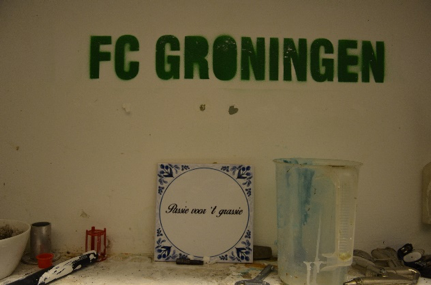
Passion for grass in the storage room -
(c) Christian Albrecht
Finally, the moment has come, and we move onto the pitch. The first thing which catches the eye are two big tents placed on the field. “The stadium is a difficult place to grow grass and to keep in good quality even in winter. The pitch lies in a pit which is not optimal for the wind and the two towers which are standing on the south side of the stadium are blocking a lot of sunlight.” The tents provide the grass with a combination of light, Co2, water and various fertilizers. Van de Velden and his colleagues move the tents, which cost up to 70,000 € each, every 24 hours to help the grass repairing itself.
GrassMaster masters grass
“Three years ago, we renovated the whole pitch,” says the groundsman. To do so, it takes at least six to ten weeks. Before, the pitch has never been changed since Euroborg opened in 2006. “It got older and oily over the years, nematodes ate the roots of the grass. So, when we won the cup in 2015, we invested at least half a million in this pitch. We planted artificial grass around the playing field, which reduced the area to maintain by 1,300 square metres. Then we took out the whole substructure, all the worms and the rubbish from the last years and put in a new sand construction with compost which is needed for the GrassMaster-system we have now.”
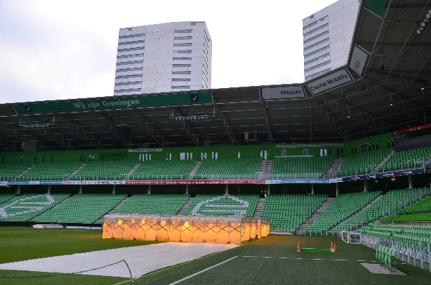
The tents provide the pitch with light which is taken away from the two towers - (c) Christian Albrecht
But what is so special with this system? Jan van de Velden shows me two test tubes, one which contains the sand construction and another with the GrassMaster-system in it. “The sand construction invites the water to flow down, so it does not stay on the surface,” he explains. “Before, when we got a raining match the pitch reacted like a sponge and as soon as the match has begun the player opened it up and damaged it a lot. That does not happen anymore with GrassMaster.” What looks like a natural pitch is really a hybrid. Every two centimetres an 18-cm-deep artificial fibre is stitched into the construction. The grassroots grow around these fibres and thereby stabilize the grass, which will not be pulled out so easily anymore. “If you put the fibres one after another it makes around 44,000 km, that is more than circumference of the earth. But if you put them all on one part it would only make seven percent of the pitch.”
From ice and mushrooms
As we walk from one goal line to the other, I ask him, how he draws the lines on the pitch. “We have strings and markers all around the field,” he answers. It works the same with the checkerboard pattern, which is mown into the grass. “They want me to do the logo of FC Groningen in the centre circle, but then I would have to do it every time,” the groundsman laughs. Since the pitch was changed in 2015, FC Groningen also get more appreciation for their field. “We were known to have a really bad pitch,” says van de Velden. In the VVCS (Vereniging voor Contractspelers = association for contract players) Veldencompetitie, which is a field competition of all pitches in the Eredivisie, FC Groningen often ended up on the last spot, before the renovation. The captain of the away team gives points from one to five for different factors. For van de Velden, however, the competition is not that meaningful. “First, it is based too much on emotions. You will rate differently when you win then when you lose. And secondly, every club has a different budget. An experienced, neutral person should inspect the grass.”
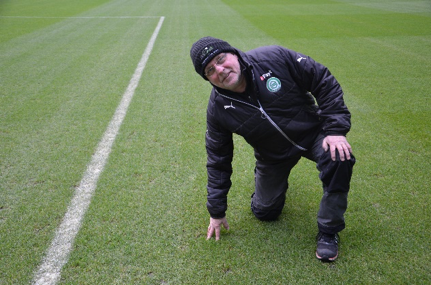
Jan van de Velden and his big love - (c) Christian Albrecht
Although the pitch was not in the best shape before the renovation, van de Velden never had to experience the worst-case scenario. “Sometimes, because of its density, grass gets rotten inside, and you get a fungicide, then the whole pitch has to be torn out if you recognize it too late.” When the weather is getting moist in August and grass is growing fast, there is also a possibility that mushrooms are coming out of the pitch in just one night. The worst experience van de Velden had, however, was in winter. “A few years ago, two days before a match against Twente it started snowing. We did our best, but in the end, we only made it worse. The heating melted the snow but because it was so cold, the water started to freeze. We tried to break the ice, but the match was cancelled, and we had to pay a fine of 20,000 €. The pitch was completely destroyed, it was terrible.”
“I do not see it as a job”
We finish our stadium tour, but my day with the groundsman is not over yet. We head to the sports complex Corpus den Hoorn, which lies in the south of Groningen in the eponymous district. On two artificial and three hybrid football pitches the team of FC Groningen trains every week. “Five years ago, we reconstructed the training area here and discovered, that the GrassMaster-system works much better. That is why we decided to change it in the stadium, too.” On one of the artificial pitches we meet one of van de Velden’s colleagues. Rowin Jansen is just about to change the net of a goal as we arrive. A task that can take hours of work. “I like that people on TV can see you have done a great job,” says Jansen while hammering the net on the goalpost.
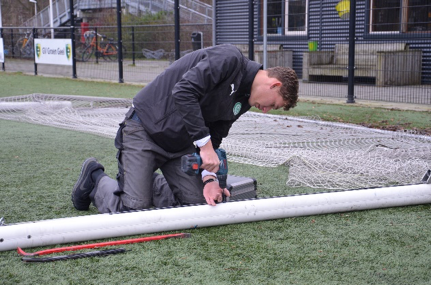
Rowin Jansen has been working at FC Groningen for two years - (c) Christian Albrecht
After van de Velden helped him with his work, we leave Jansen and the groundsman shows me some more equipment stored in a big container-like looking building. Since the club recently opened a new and even bigger clubhouse, this will soon no longer exist. We go to the cantina and drink another coffee. This is where my tour ends. For Rowin Jansen just told me, what his favourite thing about his work is, I ask Jan van de Velden the same. “As I said, it is a passion. I do not see it as a job. I like the challenge. You do not pity, when the players destroy your pitch, no, you know that. Grass is also playing top-sports. You cut it very short and want it to stay as strong as possible. So, you have to push it further than you would do with the grass in your garden. I do my work for the players and if they respond positively that is the best compliment you could get.”
Grass & wine
Jan van de Velden has a lifetime contract at FC Groningen, he lives two minutes from the stadium, he does not seek for work at a bigger club. “Of course, I would not mind working for Arsenal, who have the best pitch in England in my eyes. But I think that they have to mow the same as we have to mow here. Just that they have more possibilities, more people. I am very happy here. Our director always says: ‘Jan knows about two things: grass and wine!’. And I like that. In the daytime grass, in the night-time wine! I will work here, until they say, Jan we don’t need you anymore. And if that should happen, I will do my wine business.”

